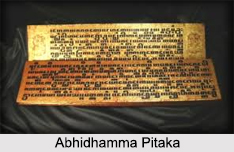 Abhidhamma Pitaka is the last of the Tripitaka, comprising the Pali Canon, the scriptures of Theravada Buddhism. It represents a more schematic, abstract, systematic form of teaching compared to the others. Abhidhamma Pitaka or Higher Knowledge or Special Teachings Basket also comprises songs, poetry, hymns and stories on Buddha and his past lives. Buddhist philosophy and psychology are its key subjects. One of the main Buddhist texts, Dhammapada, is included within this Pitaka. This includes Buddha"s sermons and his simple discussions through which he made his profound principles comprehensible to all.
Abhidhamma Pitaka is the last of the Tripitaka, comprising the Pali Canon, the scriptures of Theravada Buddhism. It represents a more schematic, abstract, systematic form of teaching compared to the others. Abhidhamma Pitaka or Higher Knowledge or Special Teachings Basket also comprises songs, poetry, hymns and stories on Buddha and his past lives. Buddhist philosophy and psychology are its key subjects. One of the main Buddhist texts, Dhammapada, is included within this Pitaka. This includes Buddha"s sermons and his simple discussions through which he made his profound principles comprehensible to all.
Origins of Abhidhamma Pitaka
According to scriptures, the Abhidhamma was taught by Lord Buddha himself. Tradition speaks that he conceived it out immediately after his enlightenment, but only taught it some years later, to the Gods. He then retold it to Sariputta, one of the two principal disciples of Buddha who became an "Arhat". He passed it on to his disciples.
Contents of Abhidhamma Pitaka
Consisting of seven primary books, Abhidhamma Pitaka renders an extensive knowledge about Buddha"s doctrines and philosophies. The seven books of Abhidhamma Pitaka are as follows:
1. Dhammasangani: This book enumerates all the Paramattha Dhamma (ultimate realities) to be found in the world.
2. Vibhanga: This book continues the analysis of the Dhammasangani, here in the form of a catechism.
3. Dhatukatha: A reiteration of the foregoing, in the form of questions and answers.
4. Puggalapannatti: Somewhat out of place in the Abhidhamma Pitaka, this book contains descriptions of a number of personality-types.
5. Kathavatthu: Another odd inclusion in the Abhidhamma, this book contains questions and answers that were compiled in the 3rd century BC, in order to help clarify points of controversy that existed between the various Hinayana schools of Buddhism during that period.
6. Yamaka: This book is a logical analysis of many concepts presented in the earlier books.
7. Patthana: This book is the longest single volume in the Tripitaka that describes the 24 laws of conditionality, through which the Dhammas interact. These laws, when applied in every possible permutation with the Dhammas described in the Dhammasangani, give rise to all knowable experience.
Thus, the Abhidhamma Pitaka contains the profound moral psychology and philosophy of the Buddha"s teaching, in contrast to the simpler discourses in the Sutra Pitaka. The concepts expressed in the Abhidhamma are like the precise scientific words and terms used by scientists to prevent misinterpretations.









